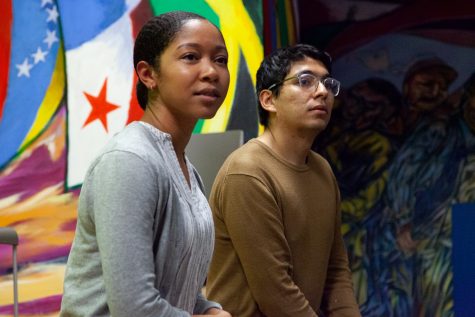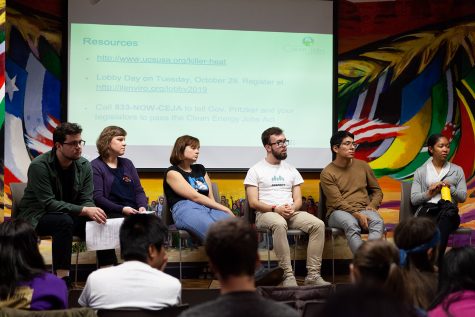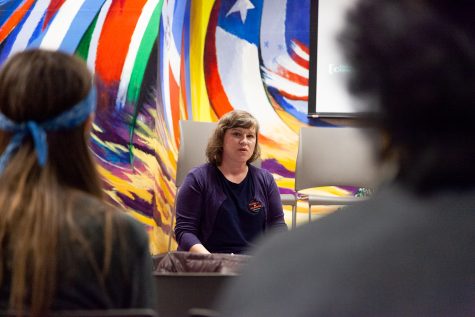Chronicle FYI: Green New Deal would make a ‘radical change’ in climate crisis
October 26, 2019

Dejah Powell and Brian Gomez from the Sunshine Movement take questions from the audience about the Green New Deal, Oct. 24, 803 South Morgan Street.
A close-knit group of college-aged students passionately chatted in a room decorated with brightly colored murals of Latino flags and other cultural symbols. Some of them wore shirts representing different environmental organizations, while some had signs with the slogan “Greta’s Groupees,” a reference to the increasingly popular climate activist Greta Thunberg.
The University of Illinois at Chicago’s student-led Roosevelt Nettwork hosted an Oct. 24 climate forum at the Rafael Cintrón Ortiz Latino Cultural Center, 803 S. Morgan St., to discuss the policies of the deal and other environmental topics, such as the heat index.
The event featured guest speakers from several local organizations that specialize in the climate crisis, including Sunrise Movement Chicago, Union of Concerned Scientists, Illinois Climate Strike and UIC Eco-Educators.
The Sunrise Movement Chicago, a branch of the national organization whose mission is to stop the climate crisis and create jobs, discussed how the Green New Deal will help alleviate the climate crisis and economic inequality, said Dejah Powell, Sunrise’s fundraising team lead.
“We haven’t seen bills like this,” said Brian Gomez, finance and operations manager at Sunrise. “It really talks about how the climate is in every issue.”
The Green New Deal aims to end the climate crisis by 2030 through the elimination of greenhouse gas emissions and implementing 100% renewable energy.

Panelists discuss the logistics of implementing the Green New Deal with the audience in UIC’s Rafael Cintrón Ortiz Latino Cultural Center, Oct. 24, 803 South Morgan Street.
The plan also calls for a new, green economy, including an “Economic Bill of Rights,” which incorporates a single-payer healthcare system, a living wage, affordable housing and free college education.
Environmentalist Colin Hines is credited for first forming the basis of the Green New Deal in 2007. However, it was not popularized until 2018 when it was adopted by the Democratic Party under Rep. Alexandria Ocasio-Cortez (D-N.Y.) and 2020 presidential candidates Sen. Bernie Sanders (I-Vt.) and Sen. Elizabeth Warren (D-Mass.).
In Chicago, the Sunrise Movement is demanding Sen. Tammy Duckworth (D-Ill.) and Sen. Dick Durbin (D-Ill.) endorse the Green New Deal.
The group is also looking to diversify its membership demographic because “Sunrise is a pretty white, middle-class movement,” Powell said. They want to make the chapter more reflective of Chicago’s diverse demographics.
Edyta Sitko, midwest senior outreach coordinator at the Union of Concerned Scientists, spoke about the group’s July report “Killer Heat in the United States: Climate Choices and the Future of Dangerously Hot Days.” The report found that heat index levels—the real temperature plus the humidity—will increase to dangerous levels if no environmental action is taken.
There are different heat index levels: above 90 degrees Fahrenheit, above 100 degrees Fahrenheit, above 105 degrees Fahrenheit and off the chart, where “the science doesn’t exist to calculate what that would feel like to your body,” Sitko said.
By mid-century, or during the years 2036–2065, the number of days with a heat index over 100 degrees Fahrenheit will double and the number of days with a heat index over 105 degrees Fahrenheit will quadruple. Typically, off the chart heat only affects 1% of Americans, but Sitko said by the end of the century, 63% of Americans will be affected.

Edyta Sitko from the Union of Concerned Scientists talks about how the heat index will change over the 21st century, Oct. 24, 803 South Morgan Street.
“It’s not looking great,” she said.
Historically in Chicago, there is only one day per year where the heat index is more than 105 degrees Fahrenheit. If no change occurs, there could be 14 days of this heat index by mid-century.
One plan of action is the Clean Energy Jobs Act similar to the Green New Deal because both advocate for 100% renewable energy and cutting carbon pollution. However, CEJA includes different pillars specifically aimed toward Illinois, such as increasing electric vehicles for ride-share programs and other mass transit options, Sitko said.
In order to pass, CEJA needs more co-sponsors. It requires 30 votes in the state Senate and 60 votes in the House. Currently, it has 29 in the Senate and 50 in the House, Sitko said.
All of the event’s speakers emphasized the importance of plans of action, like CEJA and the Green New Deal in order to protect future generations.
“The Green New Deal feels like when you’re procrastinating on an essay and, in the last few days, you write this insanely good essay,” said David Pavletic, a volunteer with the Illinois Climate Strike. “The Green New Deal is important because we have 12 years to act, and nothing has been done so far. We need to implement radical change.”
Updated 10/30/19 at 6:04 a.m. with clarification on the event’s hosting organization







